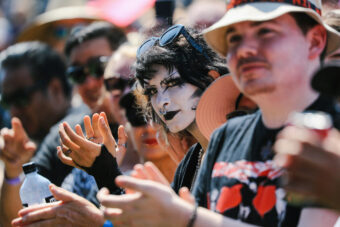Release Date: April 17, 2012
Label: Double Six
“Spiritualized is used to treat the heart and soul,” boasted the liner notes to the band’s 1997 career peak Ladies and Gentlemen We Are Floating in Space. It’s an overblown statement, of course, but not unexpected coming from frontman and former Spacemen 3 member Jason Pierce, who has spent his adult life romanticizing rock’n’roll as salvation — especially for those whose lives are lived in the red or on the margins. Over the years, he’s suffered in his pursuit of such hoary rock abstractions as “soul,” “honesty,” and “purity,” fully inhabiting his music in ways his peers haven’t. Nick Cave often can feel like a fleshed-out fictional character; Primal Scream’s Bobby Gillespie seems to wear rock clichés like a costume. Pierce, by contrast, blends into his Wall of Sound, his persona indistinguishable from his music — fitting for someone who spent his formative years within the sonically enveloping world of space rock and drone.
After that breakthrough, however, Pierce wasted time running away from his biggest record and risked running headlong into self-parody, first ratcheting up his Phil Spector and Brian Wilson fixation to absurd levels on 2001’s Let It Come Down, which famously featured about 120 musicians, and then over-correcting on 2003’s relatively stripped-down and direct Amazing Grace. But with Sweet Heart Sweet Light, Pierce has made his best album in more than a decade by re-connecting with his past (playing Floating in Space live in its entirety, on a tour to coincide with a deluxe 2009 reissue). Sweet Heart captures the balance between Spiritualized’s early meditative drone the gospel, blues, soul, and jazz influences the band embraced thereafter. Created over two years in three countries with relentlessly tinkering, the album also reproduces Pierce’s greatest trick, presenting complex, scrupulously crafted music that doesn’t feel overcooked or over-labored.
The primary difference between Sweet Heart and Floating in Space can be gleaned from the titles alone: Pierce still may be singing almost exclusively about God, love, drugs, and rock’n’roll, but he’s located the redemptive and communal aspects therein, rather than focusing solely on rejection and loneliness. Whereas Space left you emotionally spent, Sweet Heart has a galvanizing and energizing effect. It’s difficult not to credit the change to Pierce’s 2005 near-death experience (a particularly bad bout of double pneumonia that landed him in the ICU): As isolating as heartbreak and yearning can feel, even they pale next to the specter of staring down mortality. The album immediately following that experience, 2008’s Songs From A&E, had more space and simpler arrangements, attempting to evoke the harrowing emptiness of death; for Sweet Heart, Pierce steps fully back into the light, crafting a morning-after record of new-found clarity and optimism.
Pierce doesn’t bury his ambition here — he told SPIN last year that this record “encompassed all I love in rock’n’roll music,” and he executes every classic choral and orchestral move in his playbook. Yet perhaps inspired again by the Floating in Space tour, the record feels like the live work of an expanded touring band rather than an excessive studio construct. For perhaps the first time in Pierce’s career, there’s a sense of comfort and belonging, illustrated in the self-actualization of “I Am What I Am” and the make-hay-while-you-can attitude of “Little Girl.” “I used to care, but I took care of that,” Pierce claims on “Get What You Deserve,” but instead of suggesting he’s shaved down his sensibilities and embraced complacency and mediocrity, the words feel like a healthy embrace of pragmatism from someone who tended to romanticize a life of extremes.
First single “Hey Jane” and its companion piece, “Little Girl,” kick the album off with 15 minutes of eye-opening ebb and flow, followed quickly by the driving “Heading for the Top,” and later, the plaintive “Too Late.” The dynamic interplay between acoustic and electric instruments, the way the record feels large without being overstuffed, valuing warmth and texture over compression and volume, is striking. To be caught off guard by music that is multi-layered, yet still nimble and airy, wouldn’t have been possible in almost any other decade of the rock era; but here we are, deep in the days of mid-range sonics and rampant musical shortcuts, with the path from the bedroom studio to your tinny computer speakers more than well-worn.
So, sure, Pierce is deeply indebted to such now-old-fashioned notions as the restorative and redemptive power of rock — and he still crafts rock for an oversize stage, as if it’s somehow going to wind up in heavy rotation on the radio or MTV or resonate with millions (an extreme long shot, at best). The desire to make big, sweeping statements also exposes Pierce’s lyrical limitations, especially on his more stripped-down ballads, which rely on platitudes like “Freedom is there if you want it” or overfamiliar tropes (the final two songs are both structured around prayers to Jesus).
Yet, this time, Pierce’s abilities as a seasoned songwriter-guitarist-arranger transcend those limitations, and with Sweet Heart Sweet Light, he’s created time-capsule rock with a refreshing, unquestionable power. And, as Cave and PJ Harvey continue to demonstrate, it’s possible to fill a lifetime with rock songs — infused by the gospel, or the blues, or soul — which not only address our most basic human needs and desires, but pursue truth on a grander scale. Pierce may have elevated himself into their company.





